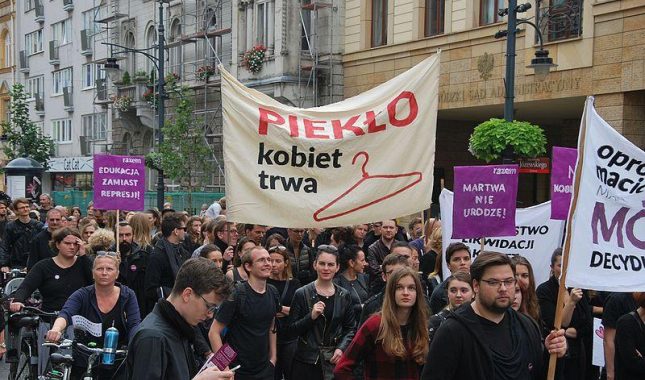Politicizing the pandemic: Poland’s response to COVID-19
How Poland's government and the conservative PiS party instrumentalized corona virus pandemic in their quest to secure more power

On March 15th at midnight Poland, responding to the increasing speed of the global spread of the coronavirus, has closed its national borders (read more about the border closure here). Since then the government progressively expanded the social distancing measures. They shut down all stores except for those deemed essential, such as grocery stores and pharmacies, outlawed gatherings of more than two people, and recently prohibited appearing in public spaces without gloves and face masks. Yet despite these restriction the current government, led by the conservative PiS (Law and Justice) party, is pushing for presidential elections to take place in May, dismissing the health and economic risks these elections would inherently pose, and changing the constitutional requirements to conduct them. Polish Constitution of 1997, among other stipulations, forbids enacting any changes to the electoral process and institutions so close to the elections – thus current proposals of PiS are directly putting the rule of law and democracy under a big question mark.
Using the reported low numbers of cases of coronavirus in Poland and the corresponding deaths (9856 infected and 401 deaths, as of April 21st), the ruling PiS party praises its own management of the current health crisis. However, the politicized and idealized version of this national response to the pandemic is far from representative. Not much is said officially about the topic of the published numbers having little to do with the reality, as the numbers of tests conducted in Poland as of April 21st was only 5397 per million citizens, compared to over 50 000 and 30 000 in countries such as Luxemburg or Estonia. Additionally, any passing away of patients who tested positive but had other, accompanying illnesses that contributed to the patient’s death are NOT considered or counted as victims of the virus.
Recently the PiS party leader, Jaroslaw Kaczynski, once again publicly criticized the EU and its inadequate response in the context of the COVID-19, thus farther exacerbating the separatist and nationalist tendencies of his right wing supporters. In fact the pandemic has been manipulated to glorify the PiS conservative agenda, and demonize not only the EU and its institutions, but also many values and ideologies it is associated with, such as multiculturalism, tolerance, and international solidarity. In a church in Silesian capital Wroclaw, during one of his pre-Easter sermons a priest claimed the virus to be a punishment from God for the country’s attempts to liberalize its same-sex partnership laws, labelled by him as ‘the rainbow plague’, a term often used since throughout the Polish society when talking about the LGBTQI community. Jews, leftists, feminists, and foreigners have all also been blamed for the virus in a variety of conspiracy theories. Even the people on the frontlines, those directly dealing with the pandemic, such as doctors and nurses, have been accused of incompetently conducting themselves and thus adding to the spread of the virus – omitting the fact that the basic medical supplies, such as surgical gloves, masks, or respirators, have been scarce, and healthcare employees themselves are largely limited in their ability to undergo tests for COVID-19. Sanepid, the Polish version of Center for Disease Control, has been practically granted a monopoly in conducting the tests, often rejecting people showing all of the symptoms, and conducting the tests selectively and in very small numbers.
Refusing to implement a wide assistance program to help people who in growing numbers are becoming unemployed, as well as the small business owners, most vulnerable parts of the Polish population are now living in a debilitating fear: without state-wide implemented relief they will likely be without means to survive within a few months. Sadly, this is of little concern of PiS at the moment. The party, having majority in both houses of the Parliament, now focused on validating its decision to not postpone presidential elections, as well as using this abnormal time of pandemic to put forward its political agendas. The latter is most clearly seen in the recent attempt of the PiS party to pass the laws which criminalize sexual education while simultaneously restricting access to abortion, now pushing to make it illegal even if the pregnancy is a result of rape, or the fetus shows clear symptoms of developmental complications. The laws, deliberated previously in Sejm (Polish House of Representatives) in 2016 and 2018, were always met with an uproar within the population, resulting in the so-called ‘marches of the black umbrellas’ which united Polish women with a surprising nonpartisan solidarity against the infringement on their reproductive rights. This time around, however, the situation is more complicated, as the government has made it clear any in-person protests or marches will be in direct violation of the new measures of social distancing because of COVID-19, and thus heavily criminalized and penalized.

Still, it is the upcoming presidential elections that prove most problematic, and have already gained the attention of various international governments and EU institutions as an undemocratic act, and if indeed conducted, will be in clear violations of numerous constitutional and national, as well as international legal stipulations. For example the Polish Constitution of 1997 forbids changing of the electoral rules within 6 months of planned elections. Now, not even a month before the planned first round of casting votes, PiS party pushes for entirely changing the voting system to voting exclusively by mail, a method previously utilized in minimal number of special cases. The government is currently spending considerate sums of money to create the new political and institutional infrastructure to facilitate this new procedure. Such voting, by the opposition outright called ‘a farce’, will not only contradict the rule of law, but additionally opens itself up for vote buying, as well as voter fraud and falsification of results. Curiously, a recent law has subjugated the Polish Post Office to the Ministry of Defense, shortly after giving the post office employees (now potentially including the Polish military) an unencumbered right to open all official mail, even the usually privileged confidential correspondence in medical or legal matters. Additionally the new voting via mail will require each vote to be accompanied by a personally signed document with a full name and PESEL (Polish ID number) of the voting individual. This means that if the presidential election indeed takes place, it will be unconstitutional also on the account of the flagrant lack of anonymity, as each vote will be clearly and easily assigned to the specific person who casted it.
The opposition speculates the current government is pushing for the election for two simple reasons. Firstly, the more times passes under the present glaring dismissal of the population in need in the times of pandemic, the lesser if their societal support. Therefore the likelihood of Andrzej Duda, the PiS candidate and current President of Poland, to get re-elected, also decreases with time. Secondly, many experts and politicians point out that once the new elections take place, the implementation of the state of exception, or even martial law in Poland due to the pandemic, can result in an indeterminate length of time of the rule of PiS, already holding the majority in Sejm and Senat, as under these special legal stipulations elections cannot be conducted. The reason why, according to the opposition, the measures have not been put forward yet, is also simple: at the end of April 2020 Polish Sad Najwyzszy, or High Court, the most important judicial body in Poland, is about to lose its last liberal Judge, Malgorzata Gersdorf. Once replaced with a PiS friendly member, the High Court will be fully in support of the ruling party, thus unlikely to stop or question any of its policies.
Will the developments in Poland, progressively more resembling the conduct of President Orban and his rise to the now dictatorship-like rule in Hungary, be the last straw to separate the country from the European Union? With its current push for isolationist and nationalistic policies, unless countered by an election of a liberal and pro-EU candidate as the new President of Poland, regrettably it appears a likely, and quite troublesome scenario.
How to cite this blog post (Harvard style)
Klajn, M.E. (2020) Politicizing the pandemic: Poland’s response to COVID-19. Available at: http://europeanbordercommunities.eu/blog/politicizing-the-pandemic-polands-response-to-covid-19 (Accessed [date]).


